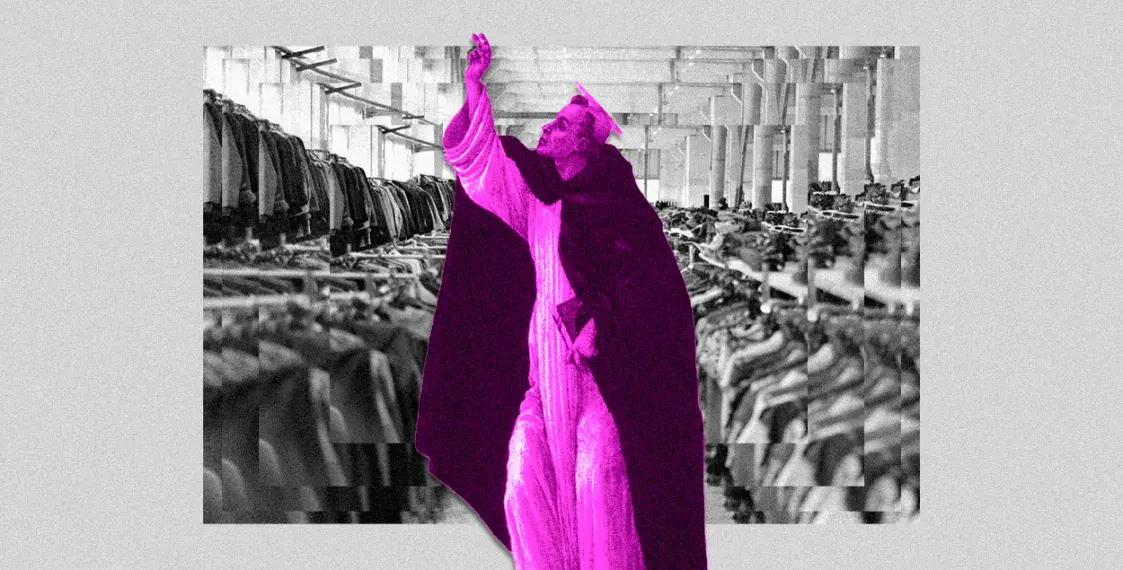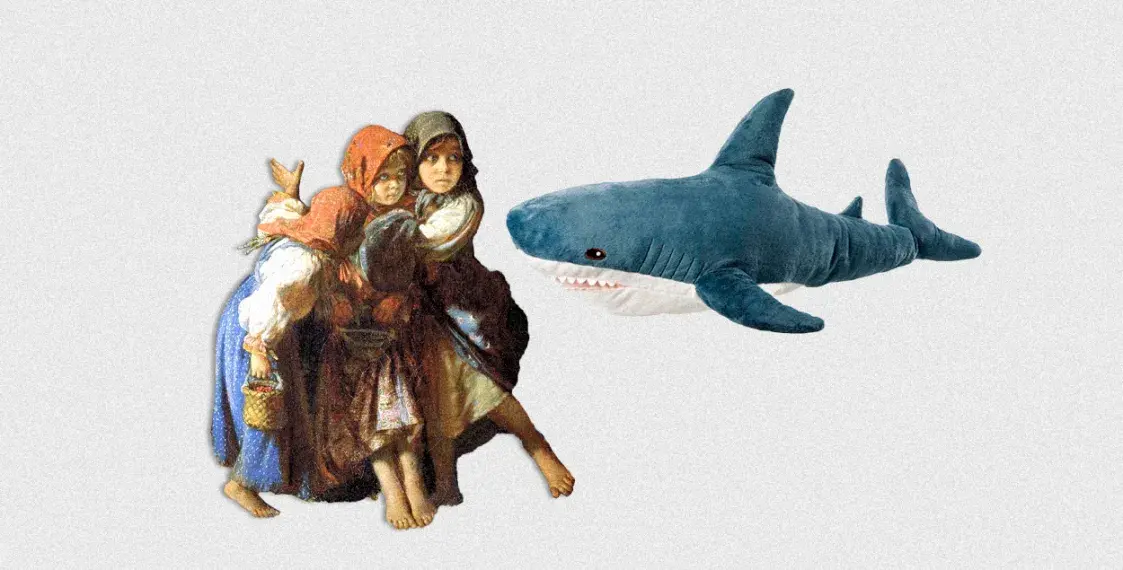EU sanctions target second-hand shops in Belarus. People react

"The time when we went to the Akropolis is remembered as the Paleozoic" / collage by Ulad Rubanau, Euroradio / калаж Улада Рубанава, Еўрарадыё
A Belarusian, Maksim, stays in his country. He sees how vegetables are getting more expensive; he sees how the price of New Balance shoes is already over 800 roubles. He takes in the reality and has almost forgotten how he used to shop in the Akropolis store in Vilnius.
When second-hand shops came under EU sanctions, Maksim asked us, politicians and emigrants, questions that touched on a broader issue. When we called him, he said in his first sentence, "Maybe it's time to think not only about yourself but also about other people?"
Here are the sincere thoughts of a Belarusian living in the country.
"Belarusian officials are now drinking champagne to the health of Europeans."
A person should have a choice, and there are fewer and fewer of us left in Belarus. We can't go to Europe, we can't bring anything from there. The time when people went to the Akropolis is remembered as the Paleozoic era.
I saw it with my own eyes: the number of second-hand shops grew, and their networks expanded. In the largest chain, ModaMax, the assortment was updated once a week. By the end of the week, most of it was gone.
If you go there at 9 a.m., you won't get into the shop. Young people who want to dress fashionably seek more or less branded clothes. There are enough videos on TikTok of a natural mosh pit in a thrift store, like at concerts. It's even dangerous.
Regular stores? The last time I was in such a store, New Balance sneakers cost about 800-900 rubles. The average salary in Belarus is 1.2-1.5 thousand rubles.
I'm not talking about statistics; I'm talking about the average salaries of my friends. So where can you buy clothes for that money?
In small towns, there is no alternative. The marketplace? Well, for a lot of money, you can get worse quality.
Second-hand shops are an excellent option for people with small children. You can buy things for yourself that you can wear for years. This is about eco-friendliness, about sustainability [of consumption].
Children grow all the time. Should I buy clothes for them in Belarusian stores? The quality and design are worse there, and things start to pill much faster than in used European ones.
And the prices. If you buy something in a second-hand store, you won't be upset if your child scratches his or her knees or gets a stain. But if you purchase a pair of pants for 100 rubles, like in the stores now, you will be angry if they are ruined.
Will they now be sent through Turkey? It's not a fact, and it will affect the prices. What am I going to do? I'll take care of what I already bought. And I will buy from Kalilaska if I need to.
However, the quality of second-hand shops has gone down in recent years. Before (as far as I know), English secondhand goods came to Belarus, and [among them] you could find some pretty cool stuff. Now, it's out of the question. Vintage things are as far away as the moon. It's where the worn-out mass-market goods end up, and the rare and cool stuff is a treasure.
Previously, the selection of second-hand goods was richer and more interesting. Now, it's mostly used Mark&Spencer and New Look, not, say, Maison Margiela. Cheap synthetics are coming in (and this is also harmful because synthetics are harder to recycle, so I would be happier if we got natural materials).
[If the ban on importing used goods from Europe comes into effect], I think Kufar will flourish even more as a resale platform or something like Open Shkaf. And now the young people pushing around in the shops buying these things are reselling them, it's their business. As far as I have heard, these guys trade through VK or Kufar.
However, these changes are not without their consequences. Our local light industry, which has long desired the closure of second-hand shops to boost sales of Belarusian goods, may find itself in a challenging position. The hope was to flood our stores with Belarusian light industry goods and prosper. Now, they are toasting to the European officials who have banned the import of second-hand goods to Belarus, but the future remains uncertain.
"I remember my mother smelling of Yves Saint Laurent perfume."
It reminds me of the Soviet Union when only a few people traveled abroad. The highest officials. And to find something cool, not to dress in gray and brown colored materials, you had to go to a special store, stand in line, and only then buy GDR boots or French perfume.
These goods were not just items, they were memories. Once you bought something, you kept it for decades. I can still recall the distinct smell of Opium by Yves Saint Laurent at my mother's house. The same smell that made her stand in line at the thrift store, the same smell that brings back a flood of memories.
How did the people around me react to these sanctions? We don't discuss or read the news here anymore. People here talk about the weather.
If you're asking about me, I think it's hypocrisy. Come on, sanctions on used goods? Okay, microchips that can be used to make weapons. But the most vulnerable people use secondhand goods, and you hit them.
Where are the democratic values? Where are they? This is just populism of the highest order. But we have not expected anything good from that side for a long time. We watch and wait. Okay, what else can you think of?
Euroradio context: who and how fought against second-hand shops in Belarus
The European Union has included second-hand clothes and accessories in the list of goods forbidden to be transported through the territory of Belarus. This is not the first time that second-hand shops have been closed. Indeed, this is usually done by Belarusian officials who try to sell as many products of state enterprises to Belarusians as possible.
Flea markets interfere with this, as Belarusians are more willing to buy cheap (often branded) clothes. Bellegprom's goods are usually much more expensive - and the company sees second-hand goods as its main competition.
First, in 2021, second-hand shops were banned from selling new clothes. Bellegprom's management wanted to go even further and proposed removing second-hand stores from large cities altogether.
It seems that European officials' actions coincided with Belarusian officials' wishes, who have long tried to limit buyers' rights.
The deputy head of the National Anti-Corruption Agency, Artsiom Brukhan, said in an interview with Euroradio that sanctions will not destroy second-hand shops - suppliers will change logistics. However, for buyers, this will result in higher prices.
But how is the wardrobe of Belarusians connected with the "overthrow of the regime"? Why hit the least protected?
"Why did second-hand shops in Russia fall under sanctions? Because under their cover, elite clothing brands were imported there, which were subject to sanctions. The EU did not want the Russian elites financing the war in Ukraine to buy luxury clothes. They wanted the elites to feel that this war did not benefit them. But even after sanctions were imposed on Russian second-hand shops, luxury goods continued to come from the EU - via Belarusian second-hand shops. And Russia continued to make money from this. Unfortunately, when the EU tried to cut off the elites from this opportunity to make money, ordinary people who go to second-hand stores suffered," Brukhan said.
By the way, the EU took another unintentional step to cut off Belarusians from second-hand shops. In May 2024, European officials adopted a new regulation on waste transportation. Why?
Since 2004, the volume of waste exports from EU countries to non-EU countries has increased by 72%. Last year, the EU exported 35 million tons of waste to other countries. This worried the European Commission: are they exploiting the poorest countries that agree to take their "garbage"?
The new rules guarantee that EU countries will behave more responsibly. According to the new regulation, the export of waste from the EU to other countries will only be allowed if these countries inform the European Commission that they agree to accept it.
And also show that they can recycle it. These new requirements will come into force on May 21, 2027.
Would Belarus submit a package of documents to the European Commission to ensure it is ready to continue importing used goods?
Given the Ministry of Antimonopoly Regulation and Trade's long-standing fight against used goods, we doubt it. But there is no way to find out: used clothing has already been included in the sanctions list.




















